The AMD Ryzen 9 7950X3D Review: AMD's Fastest Gaming Processor
by Gavin Bonshor on February 27, 2023 9:00 AM ESTCPU Benchmark Performance: Rendering And Encoding
Rendering tests, compared to others, are often a little more simple to digest and automate. All the tests put out some sort of score or time, usually in an obtainable way that makes it fairly easy to extract. These tests are some of the most strenuous in our list, due to the highly threaded nature of rendering and ray-tracing, and can draw a lot of power.
If a system is not properly configured to deal with the thermal requirements of the processor, the rendering benchmarks are where it would show most easily as the frequency drops over a sustained period of time. Most benchmarks in this case are re-run several times, and the key to this is having an appropriate idle/wait time between benchmarks to allow for temperatures to normalize from the last test.
One of the interesting elements of modern processors is encoding performance. This covers two main areas: encryption/decryption for secure data transfer, and video transcoding from one video format to another.
In the encrypt/decrypt scenario, how data is transferred and by what mechanism is pertinent to on-the-fly encryption of sensitive data - a process by which more modern devices are leaning to for software security.
We are using DDR5 memory on the Ryzen 9 7950X3D and the other Ryzen 7000 series we've tested. This also includes Intel's 13th and 12th Gen processors. We tested the aforementioned platforms with the following settings:
- DDR5-5600B CL46 - Intel 13th Gen
- DDR5-5200 CL44 - Ryzen 7000
- DDR5-4800 (B) CL40 - Intel 12th Gen
All other CPUs such as Ryzen 5000 and 3000 were tested at the relevant JEDEC settings as per the processor's individual memory support with DDR4.
Rendering
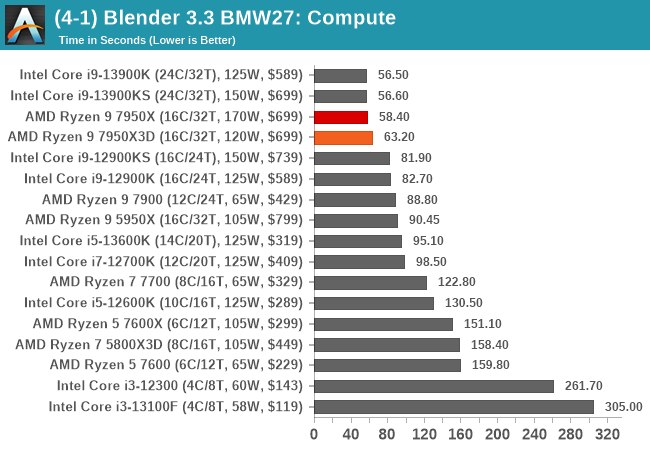
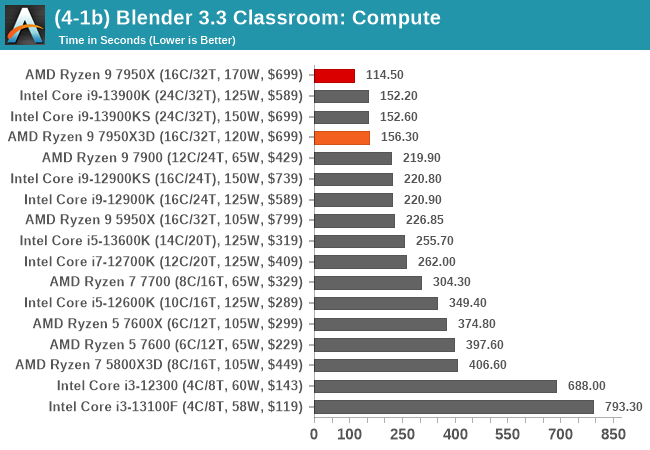
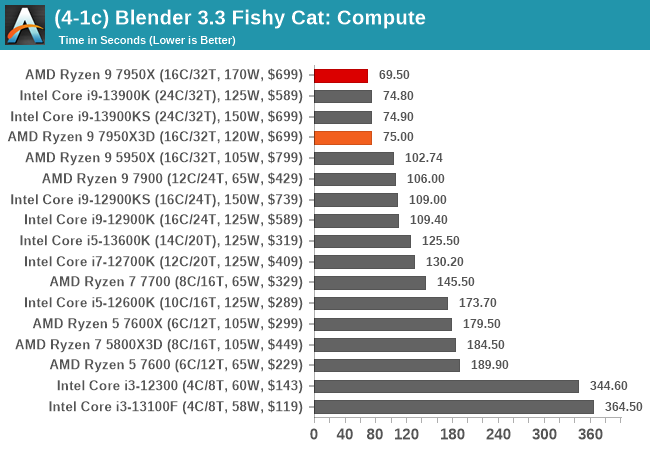
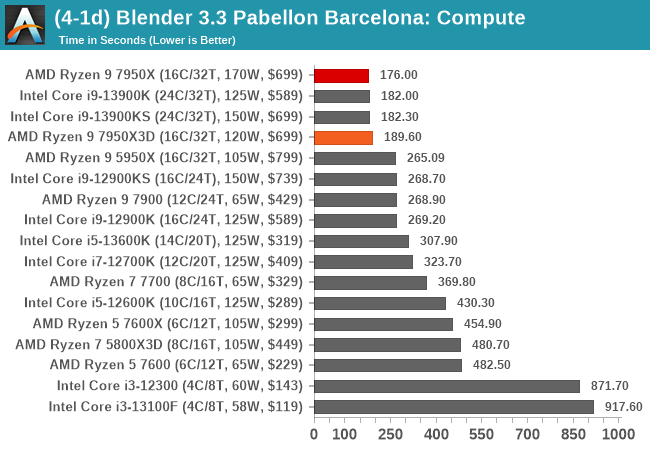
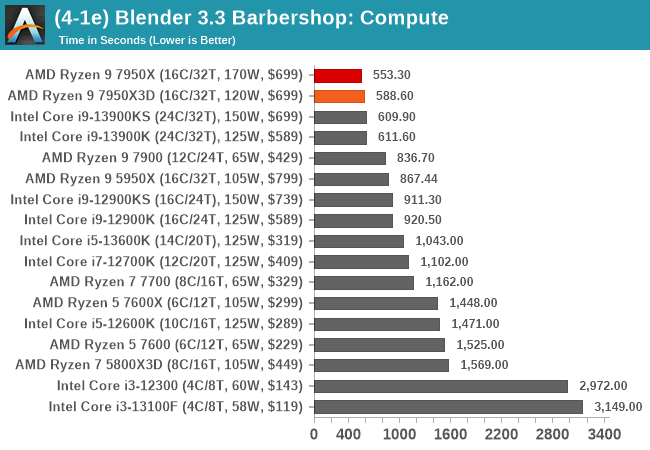
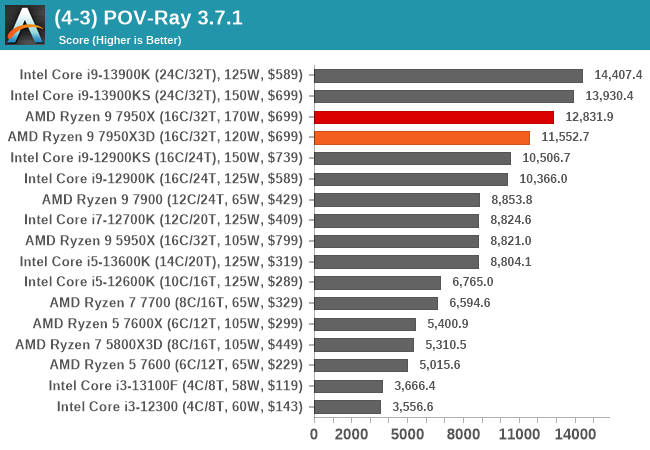
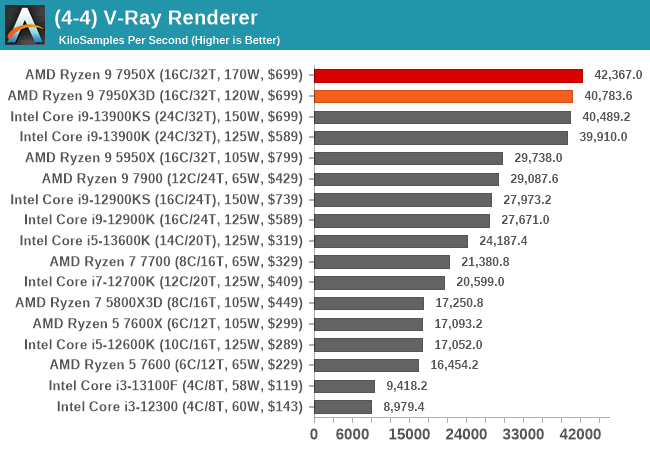
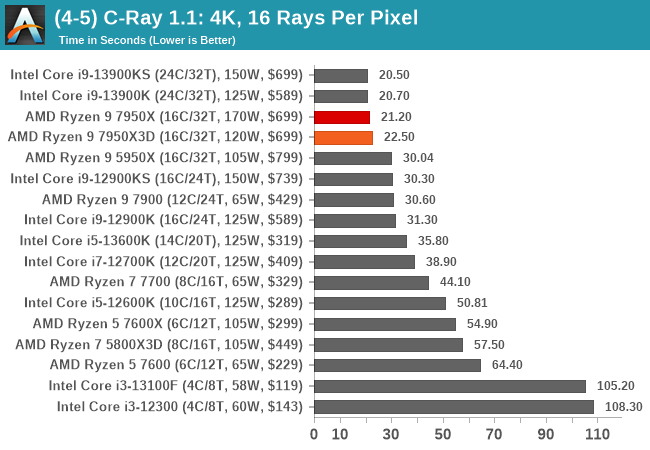
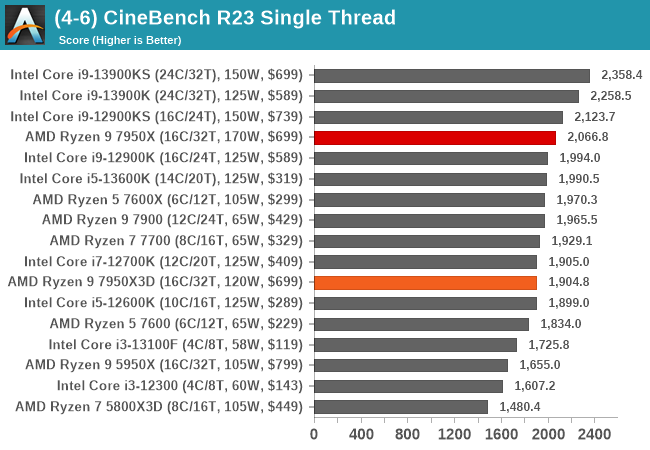
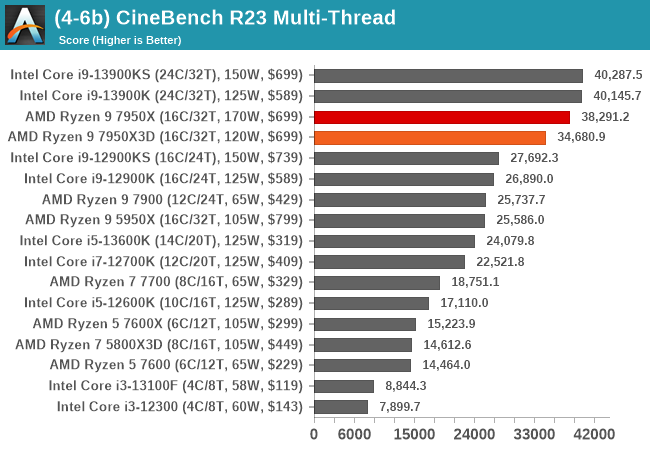
When it comes to rendering, the Ryzen 9 7950X3D doesn't quite hit the compute performance of the Ryzen 9 7950X, but it isn't too far off, given the discrepancies in power usage. It shows that the 7950X3D is more than capable of rendering workloads in an effective manner.
Encoding
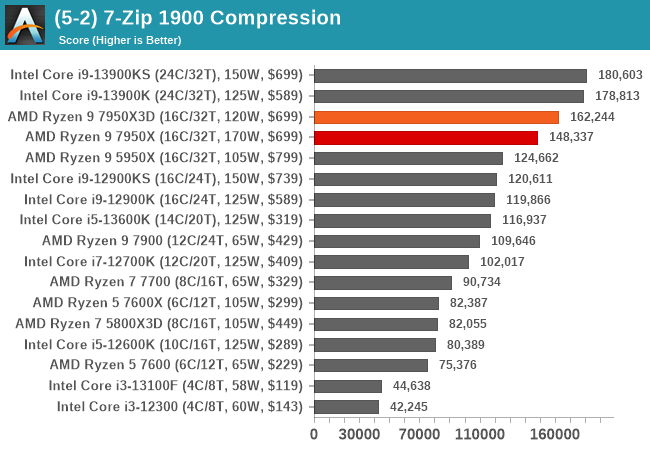
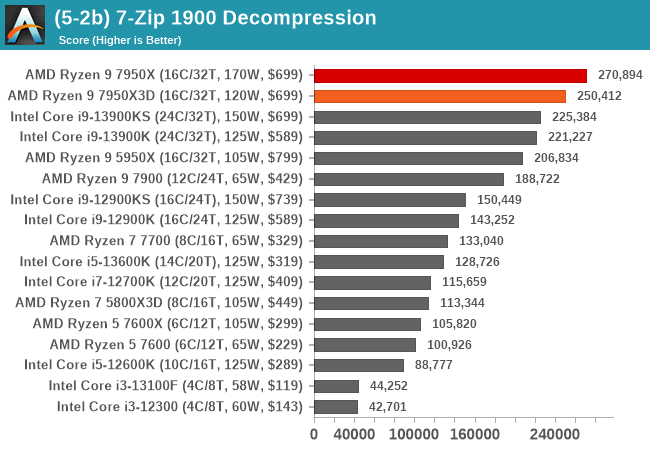
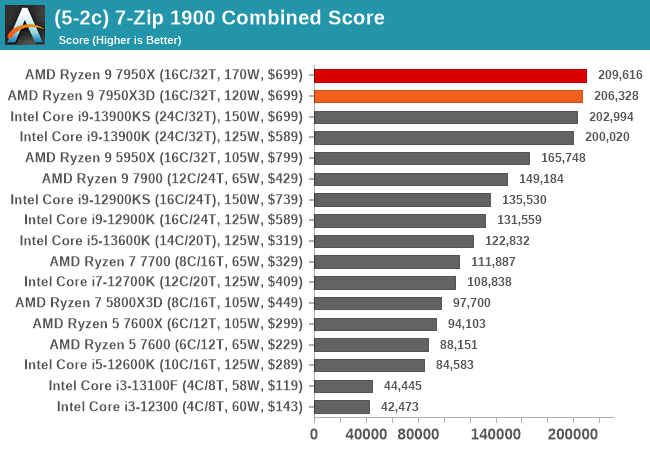
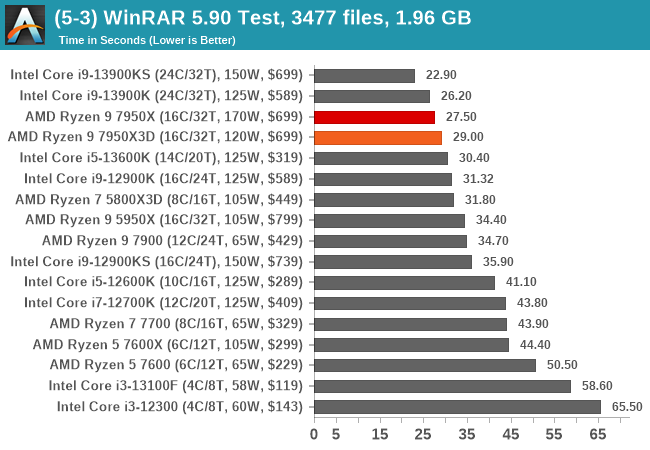
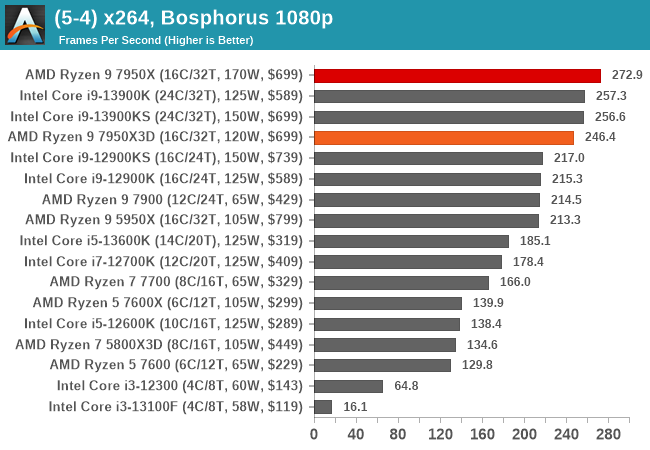
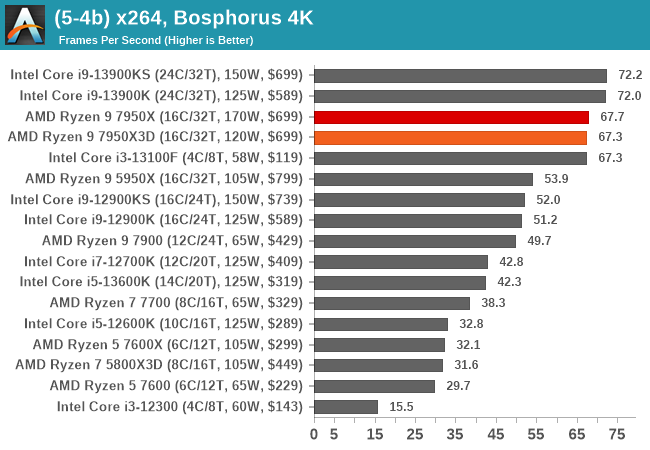
Our encoding section of the test suite is similar to other sections, where the 7950X is the faster and more power-hungry chip, which does output more performance. The Ryzen 9 7950X3D does however put in a respectable performance.










122 Comments
View All Comments
Gastec - Wednesday, March 1, 2023 - link
ROFL! You start with about $420-450 worth of a system and end up paying THOUSANDS of dollars on video cards upgrades over 6-7 years. All that during the crypto craze, the scalpers paradise and the pandemic nuttery.Kangal - Friday, March 3, 2023 - link
What are you even on about?It's perfectly common for someone to start with a midrange system, and make upgrades down the path. Sometimes it's a shortage, or pricing, or budgetary restrictions, or even lack of knowledge.
The initial PC may have only been an entry level USD $600 build. Each CPU upgrade would've costed $200 and $400, and the old ones possibly bringing $50 and $100 back (total $450). Each GPU upgrade would've costed $200, $400, $350, and $500. The old cards would've sold for $50, $100, $150, $250 back (total $900).
Which means a savvy shopper would've spent around $1,300 on upgrades in that +5 Year period. Total coming in at USD $2,000. Which is pretty good value for money.
Someone stupid, as you implied, would blow that budget on a single upgrade. Because they're buying from scalpers and not being responsible with their budget. During the past 3 years, it was very difficult to get decent parts AND cheaply, but it wasn't impossible.
flydian - Monday, February 27, 2023 - link
Agreedshinsobeam - Tuesday, February 28, 2023 - link
The 7600x and i13600k are just such good value this generation it's hard to recommend anything else.Targon - Tuesday, February 28, 2023 - link
Having only six cores is going to be limiting in a number of games going forward, so I'd say going to an eight core CPU is a safer bet for those who only game, or be prepared to replace your CPU with an eight core or better CPU in the next few years.That ability to replace the CPU with a newer generation is going to remain an advantage for AMD, since with Intel, you can count on any motherboard only being good for 1-2 generations.
Gastec - Wednesday, March 1, 2023 - link
Give us MOAR CORZ!escksu - Wednesday, March 1, 2023 - link
I just want to say that you are really cost-contrained, you might not even want to get Ryzen 7000 series... The older 5000 series is still selling very well...The performance gap between 7000 and 5000 series are evident only if you have a graphics card capable enough to produce that difference. If you are using cards like 3060, the difference becomes extremely tiny since GPU is the bottleneck.
For gamers on a budget, its better to scale back on the CPU and use that difference for a faster GPU. Eg, 5600 + 3070 cost around the same as 7600x + 3060 (might be more expensive after factoring in board and RAM). However 5600 + 3070 is clearly faster in gaming.
Hulk - Monday, February 27, 2023 - link
AMD has been on such a roll lately. This seems to be quite an underperformer. It's slower and more expensive than the 7950X in anything application related and trades blows in games. I don't think a few extra frames at 1080p in some titles is a when frame rates are already 150+ is going to matter. Seems like a lot of intellectual and manufacturing effort for very little return. I had thought the faster memory subsystem and larger cache of Zen 4 would make less of a difference than with Zen 3. This review seems to corroborate that opinion.Dante Verizon - Monday, February 27, 2023 - link
In many games where the high refresh rate matters the difference is double digits as high as 62%, so what the hell are you talking about? lolHifihedgehog - Monday, February 27, 2023 - link
Hulk smash... -ed his brain.